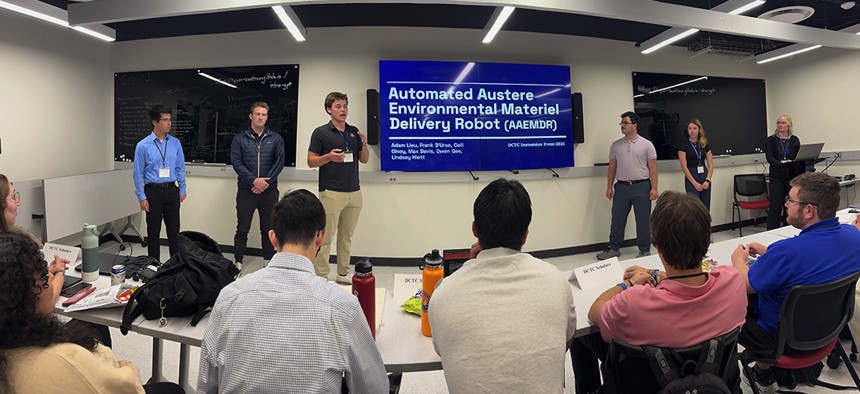
Warriors need critical skills that make them “competent, qualified, agile, professional, aggressive, innovative, risk-taking, apolitical,” Secretary Hegseth told senior officers last month. He could just as well have been talking about the department’s civilian acquisition workforce, who are vital to efforts to achieve strategic advantage over our adversaries.
Developing these skills must start long before a new employee arrives at DOD. That’s why we created the Defense Civilian Training Corps, a scholarship-for-service program that helps undergraduate students learn the skills that will help them succeed as acquisition professionals. The Pentagon launched DCTC in 2023 to prototype a college-campus talent-development model; it currently operates at University of Arizona, North Carolina A&T State University, Purdue University, and Virginia Tech; and it will expand to six universities for the cohort graduating in 2027.
While the program’s future is uncertain, what is certain is the critical need for a civilian workforce that embodies these skills. And for leaders to invest in their development.
Our competitive edge in warfighting is the culture of mission command, which empowers disciplined initiative, rooted in trust and shared understanding within a commander’s intent. The defense acquisition business ensures warfighters have the capabilities they need when they need them. There, our competitive edge is the acquisition workforce’s understanding of best practices, and the ability and willingness to think critically to solve complex problems at speed.
Day in and day out, acquisition professionals are required to make tough judgment calls; consider competing approaches; balance risk, cost, capability, and schedule; and develop strategies. Every one of these decisions is directly related to speeding capabilities to the warfighter, making warrior ethos as critical in the civilian workforce as on the battlefield.
Every acquisition-policy reform effort in recent memory (and there have been dozens) has heralded our people as our greatest asset to achieving that reform. But each time, DoD has relied upon training—mostly on-the-job training—to equip the workforce with tools for change. We’ve failed to recognize that it’s not people who are our greatest asset, but how we empower those people.
The way forward
Our leaders need an acquisition workforce with a mindset that recognizes the inherent value of data, uses digital tools for rapid iteration, and collaborates across disciplines to find creative solutions to our hardest problems. The place to gain first exposure and practice these critical thinking skills is the university setting, where multidisciplinary teams can tackle real-life problems using principles from systems engineering, lean startup methodology, and design thinking.
DCTC has done the work of researching the critical skills that DOD organizations need most and prototyping a program to develop them. It combines project-based learning in the classroom with hands-on summer internships that embed scholars in DOD teams. It is the education needed to position the civilian workforce to learn, unlearn, and relearn at the pace of today’s rapid cycles of technological evolution and policy reform—that is, to keep the defense acquisition business’ competitive edge.
DCTC is a blueprint for a talent factory; now we must scale that factory. Fortunately, the cost is low, and dropping: the first cohort of 80 DCTC scholars graduated in May at a cost to the taxpayer of about $120,000 per student. As we prepare to expand to new campuses, we have already reduced the per-student cost, and are working to cut by more than 50%.
The need for a new approach to training is urgent, and not just because of developments abroad. Today, the FAR is being overhauled and JCIDS dismantled as part of a generational effort to fundamentally change our culture from one that measures success by procedural compliance, to one that values risk-taking and creativity to achieve speed, flexibility, and lethality. But experience shows the culture will resist these changes—unless we also reform how we develop our workforce talent. We cannot rely on the training that got us here. As the Air Force’s acting acquisition executive, William Bailey, noted at the NDIA-ETI Emerging Technologies for Defense conference, progress will be made not through policy, but by people around a table.
A civilian workforce educated and empowered to think critically and communicate effectively is the missing link to a warrior-ethos culture that will ensure our strategic competitive edge. Expanding investment in DCTC is crucial to ensuring that the civilian acquisition workforce can adapt to the challenges of today and tomorrow.
Karen Thornton is a Fellow at the Acquisition Innovation Research Center, a member of the adjunct faculty at the George Washington University Law School, and a Director on the Procurement Round Table.
John Willison is a Fellow at the Acquisition Innovation Research Center, as well as founder and president of J Willison Consulting, LLC, and a certified Executive Coach.
The views presented are their own and do not necessarily represent the views of the Department of Defense (War).
The post How to foster a warrior ethos in the workforce appeared first on Defense One.




